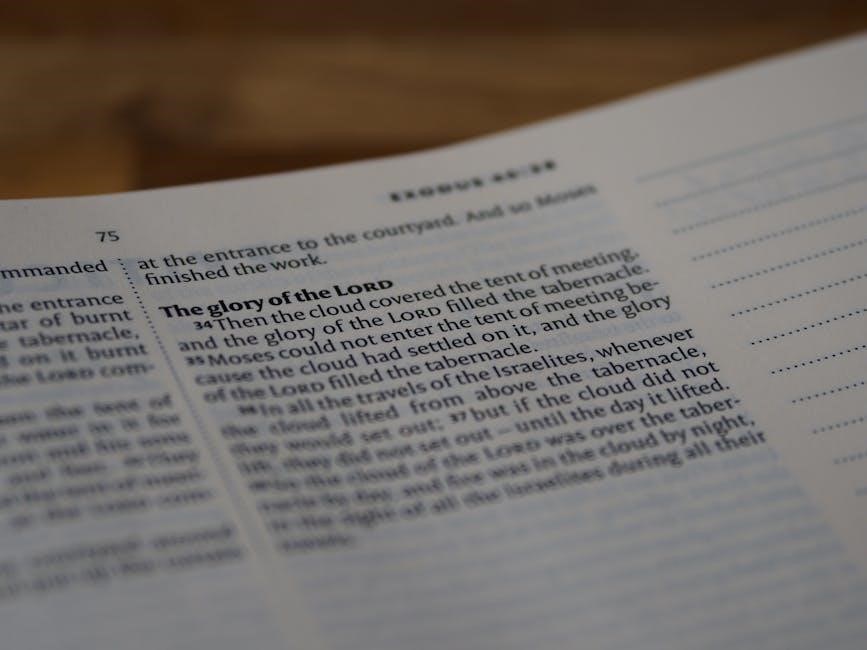The Book of the Wars of the Lord, referenced in Numbers 21:14, is an ancient, mysterious text detailing God’s sovereignty in 27 chapters, sparking scholarly debate.
Overview of the Book’s Significance
The Book of the Wars of the Lord is a deeply significant text, offering insights into God’s divine plan and sovereignty. It contains 27 chapters, each detailing various aspects of God’s nature and actions, making it a rich resource for theological study. This book is not only historically relevant but also holds profound spiritual importance, as it underscores themes of divine justice and faith.
Scholars and theologians often explore its implications, as it provides a unique perspective on God’s interactions with humanity. Despite its mysterious origins, the text remains a cornerstone for understanding biblical theology and its application in modern Christian thought and practice.
Historical Context and References
The Book of the Wars of the Lord is referenced in Numbers 21:14, linking it to ancient Israelite history. This text is believed to compile historical events and poetic descriptions of God’s actions, offering a unique window into early biblical history. Its origins remain unclear, but scholars suggest it may have been compiled from various sources over time. The book’s historical context is deeply tied to the Israelites’ journeys and conflicts, providing insights into their spiritual and cultural development. Despite its mysterious nature, it is widely regarded as a significant text for understanding divine themes and early religious practices. Its references to wars and divine interventions highlight its importance in studying the theological and historical narrative of the ancient world.

Historical Background
The Book of the Wars of the Lord, referenced in Numbers 21:14, is an ancient text detailing God’s role in historical events, comprising 27 chapters.
Biblical References to the Book in Numbers 21:14
The Book of the Wars of the Lord is referenced in Numbers 21:14, which highlights its significance in biblical history. This ancient text, comprising 27 chapters, details God’s sovereignty and divine justice, emphasizing His role in guiding Israel. The reference in Numbers underscores its historical importance, linking it to Israel’s wilderness journey and victories. Scholars believe it may have served as a collection of poems or songs celebrating God’s interventions. The book’s themes of faith, obedience, and trust in divine providence align with broader biblical teachings, making it a fascinating yet enigmatic text for study and reflection.
Archaeological and Scholarly Perspectives
Scholars and archaeologists have long debated the origins and authenticity of the Book of the Wars of the Lord. While no physical manuscript has been discovered, references in Numbers 21:14 suggest its historical significance. Many believe it may have been a collection of ancient poems or songs chronicling Israel’s military victories. Archaeological findings from the Near East provide context for the book’s themes of divine intervention and leadership. Scholars argue that its content reflects early Hebrew traditions, blending history with theological insights. Despite limited physical evidence, its influence on biblical narratives remains undeniable, sparking ongoing academic discussion about its composition and purpose.

Theological Themes
The Book of the Wars of the Lord explores divine sovereignty, justice, and faith, emphasizing God’s guidance of His people through covenant and leadership under His command.
God’s Sovereignty and Divine Justice
The Book of the Wars of the Lord underscores God’s sovereignty, portraying Him as the ultimate authority guiding history and destiny. Divine justice is a central theme, as God judges nations and individuals based on their actions and faithfulness. The text emphasizes His control over all events, reinforcing the idea that His will prevails. It highlights His mercy and justice as two sides of His character, balancing punishment for disobedience with grace for the repentant. Through historical accounts and prophetic insights, the book illustrates God’s justice as both corrective and redemptive, ultimately aiming to restore His people to fellowship with Him. This theme reassures believers of His faithfulness and sovereign plan, even in times of turmoil or uncertainty.
The Role of Faith and Obedience
The Book of the Wars of the Lord highlights faith and obedience as essential responses to God’s sovereignty. It illustrates how trusting in God’s plan and submitting to His will leads to spiritual victory and divine favor. Through accounts of Israel’s journeys, the text emphasizes the consequences of disobedience and the blessings of faithfulness. Obedience is portrayed as a demonstration of love and devotion to God, while faith is the foundation for navigating life’s challenges. The book teaches that true faith manifests in action, aligning one’s life with God’s commands and promises. This theme encourages believers to rely on God’s guidance, fostering a deeper trust in His providence and justice, even in uncertain times. It underscores the transformative power of living in accordance with divine principles.

Key Chapters and Verses
The Book of the Wars of the Lord contains 27 chapters, each highlighting God’s divine justice and sovereignty through historical events and prophetic insights, guiding believers in faith.
Analysis of Major Events Described
The Book of the Wars of the Lord contains detailed accounts of significant battles and divine interventions, showcasing God’s sovereignty over history. These events emphasize faith, obedience, and the fulfillment of divine promises. The text highlights the wilderness journeys, the conquest of Canaan, and the struggles of the Israelites, illustrating God’s justice and mercy. Symbolic elements, such as the bronze serpent in Numbers 21:9, are woven into the narrative to convey spiritual lessons. The book’s events are not merely historical but serve as a testament to God’s active involvement in human affairs, reinforcing the theme of trust in His providence. These accounts provide a rich tapestry for theological reflection and practical application in modern Christian living.
Symbolism and Spiritual Lessons
The Book of the Wars of the Lord is rich in symbolism, offering profound spiritual lessons for believers. The bronze serpent in Numbers 21:9 symbolizes redemption and healing, pointing to Christ’s sacrificial death. Battles described in the text often represent spiritual warfare, emphasizing trust in God’s providence. The wilderness journeys illustrate the human struggle with faith and obedience, while divine interventions highlight God’s mercy and justice. These narratives serve as allegories for modern Christian living, teaching perseverance, humility, and reliance on divine guidance. The book’s symbolism underscores the transformative power of faith, encouraging readers to seek spiritual renewal and alignment with God’s will. Through these lessons, the text remains a timeless guide for spiritual growth and discipleship.

Modern Relevance and Interpretations

The Book of the Wars of the Lord remains a powerful text for modern faith, offering insights into divine justice and sovereignty, inspiring contemporary Christian teachings and reflections.
Contemporary Applications of the Book’s Teachings
The Book of the Wars of the Lord offers timeless lessons for modern believers, emphasizing trust in God’s sovereignty and divine justice. Its teachings encourage resilience in the face of challenges, reminding readers of God’s guidance during uncertain times. The book’s themes of faith and obedience resonate deeply, inspiring individuals to align their lives with biblical principles. In a world grappling with moral and spiritual dilemmas, the text provides a framework for understanding God’s role in human history and personal struggles. By reflecting on its teachings, contemporary Christians can find strength in surrendering to God’s will and trusting His plan, even when circumstances seem overwhelming. This ancient text remains a powerful resource for spiritual growth and daily living.
Impact on Christian Doctrine and Practice
The Book of the Wars of the Lord has profoundly influenced Christian theology, reinforcing the doctrine of God’s sovereignty and divine justice. Its emphasis on faith and obedience aligns with core Christian teachings, shaping believers’ understanding of their relationship with God. The book’s themes are often referenced in sermons and devotionals, guiding Christians in applying biblical principles to their lives. It underscores the importance of trust in God’s plan, even during adversity, and highlights the necessity of spiritual surrender. By reflecting on its teachings, Christians are encouraged to live out their faith authentically, fostering a deeper commitment to worship, community, and ethical living. This text continues to inspire doctrinal discussions and practical applications within modern Christian communities.

Academic and Religious Discussions
Scholars debate the origins and authenticity of the Book of the Wars of the Lord, exploring its historical context and theological implications, shaping religious thought and dialogue.
Debates Among Scholars About the Book’s Origins
Scholars actively debate the origins of the Book of the Wars of the Lord, with theories ranging from it being a single, cohesive text to a compilation of ancient sources. Some argue it was written during the 2nd millennium BCE, while others propose a later composition, possibly during the Israelite monarchy. Linguistic and archaeological evidence are frequently cited to support these claims. The book’s mention in Numbers 21:14 has sparked discussions about its role in early Hebrew literature and its potential influence on biblical narratives. These debates highlight the complexities of attributing authorship and dating ancient texts, leaving its precise origins uncertain but deeply intriguing for academic exploration.

Comparative Analysis with Other Religious Texts
The Book of the Wars of the Lord shares thematic parallels with other religious texts, such as the Quran’s accounts of divine sovereignty and the Bhagavad Gita’s emphasis on duty and divine guidance. Its focus on God’s justice and warfare mirrors themes in the Iliad and the Mahabharata, where divine intervention shapes human conflict. Unlike these texts, however, the Book of the Wars of the Lord centers on monotheistic theology, emphasizing God’s exclusive authority. Scholars note its unique structure, with 27 chapters detailing divine actions, contrasting with the more narrative-driven approaches of other sacred writings. This comparative lens highlights its distinctive theological and literary contributions to religious literature.
